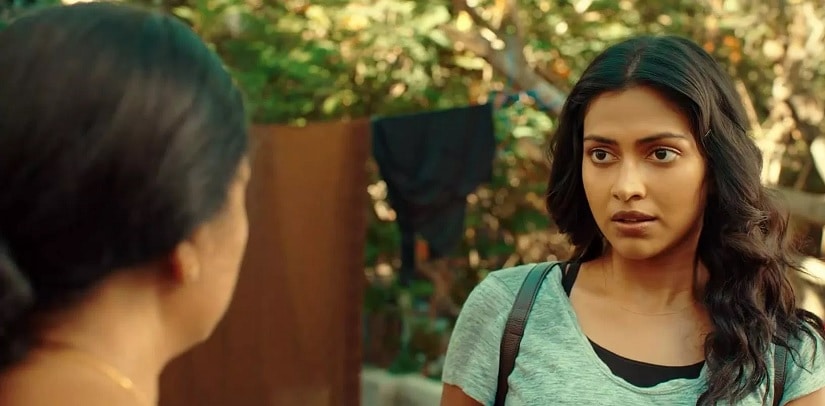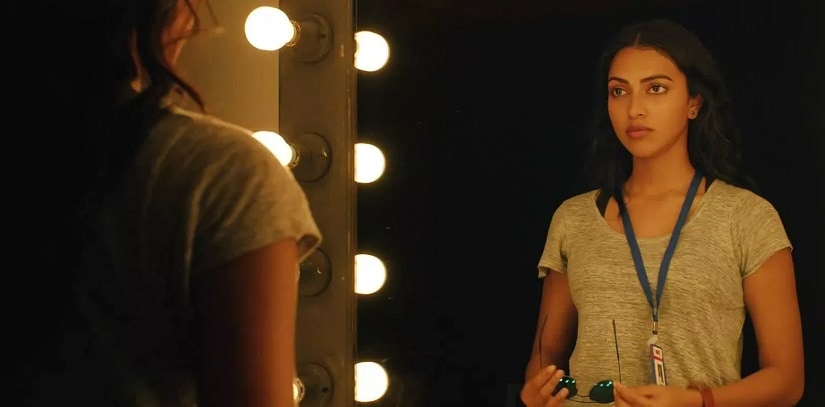In the couple of days since
_Aadai_ ’s release, Rathna Kumar has been receiving bouquets, back-handed compliments and brickbats with the same equanimity. And he does not shy away from a post-mortem of his film. He’s still giving interviews, this time explaining why a section of the audience felt the climax of his film went against everything the film set out to convey. [caption id=“attachment_7068681” align=“alignnone” width=“825”] Rathna Kumar, Amala Paul and the Aadai team[/caption] You chose to have men being decent in the film. Men who can handle rejection, men who don’t hesitate stopping a friend/colleague from stripping to read the news, and men who don’t judge women drinking or smoking… All those characters emerged from my head, so I wanted them to be this way. I did not want any contradictions in the way they thought. In the second half, you have the police officers, the stranger from the opposite building, the male customer care executives over the phone… all of whom trigger a certain hesitation in Kamini. I wanted her to have a safe circle where she could be herself, where she is not judged. So then, why did you have a girl explain ‘honour’ and ‘freedom’ to Kamini in the climax? Well, some felt that I was imposing my views on how women should dress through the dialogue of the mother, who tells Kamini that her bra strap is showing. Likewise, for the reference to the ‘free the nipple’ campaign. But, they forget that through the character of Jenny, I put forth the idea that each person looks good in a particular kind of garment, and they should have the freedom to wear what they want. Kamini thinks she will look lovely even without clothes. Those are the traits of her character. Some people have felt this is a film against prank calls. Does it bother you that they have missed the while point of the film? I expected polarised reviews and viewpoints. Likewise, I have to accept how some people read the film. This diversity of opinion is good. This is not a film where everything is black and white. Post the release, are you wondering if you could have redone something in the film? Oh yes, the line about feminism in the banter between the mother and daughter. It was a line that went with the flow of that conversation. Now, I see that someone people have taken that as the hook to view the film from. And therefore, it became a film on feminism for some. That was not the point at all. The film is about personal freedom and how once chooses to use it. So now, yes, I wonder if I should have gone without that line. [caption id=“attachment_7068661” align=“alignnone” width=“825”]
 Amala Paul as Kamini in Aadai[/caption] What is your opinion on the word ‘maanam’ (honour ) that Nangeli uses when she sees that Kamini has covered herself with toilet wipes? Does that not take away from what Kamini’s unapologetic nature? Like a lady who watched the film told me, Kamini does not mind baring her body, but only when she has choice. She’s now caught in an abandoned office, and if she emerged naked from there, it makes her lose face. Her agency is snatched away from her. Yes, Kamini is the kind of person who would have stripped, but only if that was her wish in the first place. The freedom I speak about in the film relates to her profession. She has the freedom to do a show, but she’s reminded by Nangeli to use it with discipline, to not trample on other’s freedom. It was never about the dress or lack of it. Again, in retrospective, I’ll probably reword some dialogues so that there is no ambiguity. What is maanam in your opinion? It’s a very personal thing, and differs from person to person. Each one has a different definition, and each one is valid. Just like how each one has a different definition for love. You are possibly the first director to publicly back the MeToo movement, with the scene that leads to the climax. Where did that courage come from in an industry that has largely been silent? I wanted the transition of Kamini to Sudhandhira Kodi to come across well, and I wanted to show how she was using the same technology that she used to prank, to do societal good. I did not have the time to explain a fresh issue, and I wanted to strike with a topic that is already in people’s minds. At a personal level, I totally backed the MeToo movement, and respected it a lot. I felt it would do some good if I used it here. To be safe, I gave that character my name! Yes, some people mentioned that one of the cast was also named, but I knew that only after the film was completed. That was a slip, but ended up being ironical too, along with the other ironies in the film. [caption id=“attachment_7068641” align=“alignnone” width=“825”]
Amala Paul as Kamini in Aadai[/caption] What is your opinion on the word ‘maanam’ (honour ) that Nangeli uses when she sees that Kamini has covered herself with toilet wipes? Does that not take away from what Kamini’s unapologetic nature? Like a lady who watched the film told me, Kamini does not mind baring her body, but only when she has choice. She’s now caught in an abandoned office, and if she emerged naked from there, it makes her lose face. Her agency is snatched away from her. Yes, Kamini is the kind of person who would have stripped, but only if that was her wish in the first place. The freedom I speak about in the film relates to her profession. She has the freedom to do a show, but she’s reminded by Nangeli to use it with discipline, to not trample on other’s freedom. It was never about the dress or lack of it. Again, in retrospective, I’ll probably reword some dialogues so that there is no ambiguity. What is maanam in your opinion? It’s a very personal thing, and differs from person to person. Each one has a different definition, and each one is valid. Just like how each one has a different definition for love. You are possibly the first director to publicly back the MeToo movement, with the scene that leads to the climax. Where did that courage come from in an industry that has largely been silent? I wanted the transition of Kamini to Sudhandhira Kodi to come across well, and I wanted to show how she was using the same technology that she used to prank, to do societal good. I did not have the time to explain a fresh issue, and I wanted to strike with a topic that is already in people’s minds. At a personal level, I totally backed the MeToo movement, and respected it a lot. I felt it would do some good if I used it here. To be safe, I gave that character my name! Yes, some people mentioned that one of the cast was also named, but I knew that only after the film was completed. That was a slip, but ended up being ironical too, along with the other ironies in the film. [caption id=“attachment_7068641” align=“alignnone” width=“825”] Another still from Aadai[/caption] How did you work with cinematographer Vijay Karthik Kannan to create a sense of nakedness in the film, but never allowing it to turn voyeuristic? We worked backwards, and planned every shot division. We used sun flares, shadows, silhouettes, reflections, out-of-focus… every trick in the trade to create a film where the camera moves fluidly but is aesthetic about the protagonist’s plight. Aadai was your first draft before you made Meyaadha Maan? What about it appealed to you as a writer? I actually considered crowdfunding this script but did not pursue it. In every survival drama, the end threat is death. Here, the challenge is very different. You won’t die, won’t get killed, but you still are a prisoner. That intrigued me. What space did Kamini come from? I wanted a girl who would move away from every definition of what it traditionally means to be a woman. I wanted her to be a go-getter. She’s actually mature, and that shows when she hugs the girl who left her naked, and moved on with a certain calmness. It’s almost like she needed to be shown a mirror to tone down her bullying nature. But her rules stay the same; she just changes the playground. And finally, when did you decide it was Amala who could give life to Kamini? When I wrote the script, Kamini was a 3D animated character in my head. When Amala became a possibility, I could see no one but her. She looks good in every garment, with or without make-up, she can basically pull off any character trait. I think that’s why Kamini has been so well received. Amala managed to keep the momentum going through the film, and had the audience rooting for her.
Another still from Aadai[/caption] How did you work with cinematographer Vijay Karthik Kannan to create a sense of nakedness in the film, but never allowing it to turn voyeuristic? We worked backwards, and planned every shot division. We used sun flares, shadows, silhouettes, reflections, out-of-focus… every trick in the trade to create a film where the camera moves fluidly but is aesthetic about the protagonist’s plight. Aadai was your first draft before you made Meyaadha Maan? What about it appealed to you as a writer? I actually considered crowdfunding this script but did not pursue it. In every survival drama, the end threat is death. Here, the challenge is very different. You won’t die, won’t get killed, but you still are a prisoner. That intrigued me. What space did Kamini come from? I wanted a girl who would move away from every definition of what it traditionally means to be a woman. I wanted her to be a go-getter. She’s actually mature, and that shows when she hugs the girl who left her naked, and moved on with a certain calmness. It’s almost like she needed to be shown a mirror to tone down her bullying nature. But her rules stay the same; she just changes the playground. And finally, when did you decide it was Amala who could give life to Kamini? When I wrote the script, Kamini was a 3D animated character in my head. When Amala became a possibility, I could see no one but her. She looks good in every garment, with or without make-up, she can basically pull off any character trait. I think that’s why Kamini has been so well received. Amala managed to keep the momentum going through the film, and had the audience rooting for her.
Days after the release of Aadai, Rathna Kumar is still giving interviews, explaining why a section of the audience felt the climax of his film went against everything the film set out to convey.
Advertisement
End of Article


)
)
)
)
)
)
)
)
)



